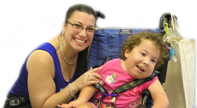NIH Announces First National Research Study Recruitment Registry
Contact:
Cindy McConnell
301-435-0888
Nationwide Registry to "Match" Volunteers with Researchers
Individuals who want to participate in research studies now can connect online with researchers nationwide through the first disease-neutral, volunteer recruitment registry.
ResearchMatch.org is a not-for-profit secure Web site, designed to provide people who are interested in participating in research the opportunity to be matched with studies that may be the right fit for them.
ResearchMatch offers an easy-to-use, free and safe way for volunteers to connect with thousands of researchers who are conducting research on a wide range of diseases.
The site is a collaborative effort of the national network of medical research institutions affiliated with the Clinical and Translational Science Awards (CTSAs). The CTSA program, which is led by the National Center for Research Resources (NCRR), a part of the National Institutes of Health, is focused on enhancing local and national efforts to enhance the translation of laboratory discoveries into treatments for patients.
"Participant recruitment continues to be a significant barrier to the completion of research studies nationwide - recent NIH data indicates that just 4 percent of the U.S. population has participated in clinical trials," said NCRR Director Barbara Alving, M.D. "ResearchMatch is a tool that can improve the connection and communication between potential participants and researchers providing opportunities for the public to contribute to advancing new treatments."
The convenient and user-friendly registry employs a familiar research matching model that is complementary to Clinicaltrials.gov. One key difference is that ResearchMatch places the burden of connecting the right volunteers with the right study on the researchers, whereas Clinicaltrials.gov asks volunteers to identify the trials that could work for them.
"ResearchMatch offers a convenient solution to the complex, competitive and often costly participant recruitment system," said Gordon Bernard, M.D., principal investigator of the Vanderbilt CTSA, which hosts the national registry. "NIH data indicates that 85 percent of trials don't finish on time due to low patient participation, and 30 percent of trial sites fail to enroll even a single patient. We aim to help combat these challenges with ResearchMatch."
How ResearchMatch Works
ResearchMatch will match any interested individual residing in the United States with researchers who are approved to recruit potential research volunteers through the system. After an individual has self-registered to become a volunteer, ResearchMatch's security features ensure that personal information is protected until volunteers authorize the release of their contact information to a specific study that may be of interest to them. Volunteers are notified electronically when they are a possible match and then make the decision regarding the release of their contact information. It also will promote choice as there are no obligations on the volunteer to participate in studies.
For the first year of the project, only researchers affiliated with participating CTSA institutions are eligible to use ResearchMatch. However, plans are in place to make ResearchMatch available beyond the CTSA consortium by 2011. Currently 52 individual institutions associated with 40 CTSA sites are part of the ResearchMatch network. A list of these institutions may be viewed here.
To learn more about ResearchMatch and to register as a volunteer, click here.
About the CTSA Consortium
The CTSA consortium is a national network of 46 medical research institutions working together to improve the way biomedical research is conducted across the country. The consortium, funded through Clinical and Translational Science Awards (CTSAs), shares a common vision to reduce the time it takes for laboratory discoveries to become treatments for patients and to engage communities in clinical research efforts. It also is fulfilling the critical need to train a new generation of clinical researchers. The CTSA program is led by the National Center for Research Resources, part of National Institutes of Health.
Launched in 2006, this network now includes awardees in 26 states. When the program is fully implemented, it will support approximately 60 CTSAs across the nation.
For more information about the CTSA program, visit www.ncrr.nih.gov/ctsa. The CTSA consortium Web site, which provides information on the consortium, current members and new grantees, can be accessed at www.CTSAweb.org.
The National Center for Research Resources, part of NIH, provides laboratory scientists and clinical researchers with the resources and training they need to understand, detect, treat and prevent a wide range of diseases. NCRR supports all aspects of translational and clinical research, connecting researchers, patients and communities across the nation. For more information, visit www.ncrr.nih.gov.
The National Institutes of Health (NIH) - The Nation's Medical Research Agency - includes 27 Institutes and Centers and is a component of the U.S. Department of Health and Human Services. It is the primary federal agency for conducting and supporting basic, clinical and translational medical research, and it investigates the causes, treatments, and cures for both common and rare diseases. For more information about NIH and its programs, visit www.nih.gov.
Last Edited: 11/16/09 02:12 PM by Danielle Onunkwo







